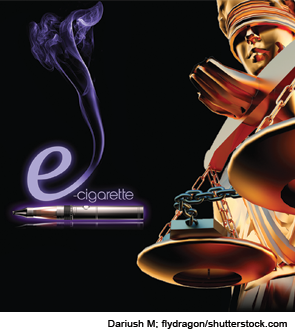Explore This Issue
December 2014Otolaryngologist Laurence DiNardo, MD, knows a nurse who has quit smoking traditional cigarettes, but now she’s using the electronic version. The vaporizer, as electronic cigarettes are often referred to, is a step in the woman’s process toward eventually weaning herself off of nicotine.
Could the largely untested e-cigarette be viewed as an improvement over the once ubiquitous Marlboro Red? Not really—not in Dr. DiNardo’s eyes. He considers e-cigarettes a nicotine delivery system, one that runs on batteries and includes a liquid composed, at least in part, of propylene glycol.
Further, that system comes with a host of questions that, to date, have few answers. How safe are e-cigarettes? What is their long-term effect on the mouth and throat, where otolaryngologists have for so long seen the damage caused by traditional cigarette use? What about the “e-liquids” these cigarettes use? How is the dosage of nicotine regulated? What is the cumulative effect of their longtime consumption? Do these products actually help people to quit smoking?
“On the surface, it sounds like it would be a healthier alternative to tobacco use, but it’s still the Wild West out there in terms of these unregulated nicotine dispensers—which is essentially what they are,” said Dr. DiNardo, MD, FACS, the Peter N. and Julia Pastore Professor and chair of the department of otolaryngology/head and neck surgery at Virginia Commonwealth University Health System in Richmond.
There is a national spotlight on e-cigarettes as the U.S. Food and Drug Administration (FDA) weighs how to regulate them, and it’s a process otolaryngologists are watching closely, given the prevalence of tobacco-related cancer cases. An April proposal sought to exert the FDA’s authority over e-cigarettes and other tobacco products as an extension of the Family Smoking Prevention and Tobacco Control Act of 2009.
No decision has been made yet on the rule, and no timeline for a decision has been announced.
Fire Up the Debate
The debate has stirred passions in otolaryngology circles, with perhaps none so involved as Robert Jackler, MD, the Edward C. and Amy H. Sewall Professor and chair of otorhinolaryngology at Stanford University School of Medicine in Stanford, Calif. In 2007, Dr. Jackler and his wife founded Stanford Research into the Impact of Tobacco Advertising (SRITA), which looks into the tobacco industry’s outreach to consumers. The group’s 20,000 collected ads are housed at the National Museum of American History, part of the Smithsonian Institution.
Dr. Jackler sees e-cigarettes as potentially safer than tobacco-combustible cigarettes, but that doesn’t mean he’d feel comfortable calling them safe, particularly as there’s no research on the health effects of 10, 20, or 30 years of inhaling “propylene glycol and glycerin into the mouth, throat, larynx, and lungs.” Dr. DiNardo added that while some may argue that the chemicals in the liquid have “long been ingested in other products, inhaling them may be another matter.”
